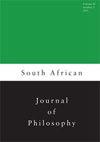How to mitigate the horrific consequences of witchcraft belief in Africa
IF 0.2
3区 哲学
0 PHILOSOPHY
引用次数: 0
Abstract
It is pertinent, at this point in human intellectual history, to address the pervasive but misleading position among Africans that witchcraft is necessarily feminine and cruel. The medieval era’s untenable conception and detection of witchcraft as an absolutely callous and womanly affair filtered into colonial and then contemporary Africa to become full-blown via Pentecostalism, with horrendous social consequences. From personal research, I foreground two fundamental theses: (1) for ancient Africans, witches are neither necessarily malicious (since they can be benevolent sometimes, if propitiated correctly) nor essentially feminine (since it is possible for men too, to engage in the “craft”); and (2) there is no conclusive evidence from revealed scriptures which endorses Christianity’s understanding of witches as predominantly women. I arrive at this finding by employing the methods of philosophical and hermeneutical analyses of the Ifá literary corpus and the Judeo-Christian Bible. These findings do not, however, excuse the evil done in the name of the craft in contemporary Africa, hence the urgency for intellectual intervention. As a panacea, this study posits that with proper medical and scientific explanations, the horrific scourges induced by the belief in witches among contemporary Africans can be tackled almost effortlessly.如何减轻非洲巫术信仰的可怕后果
在人类思想史上的这个时刻,解决非洲人普遍存在的误解是巫术必然是女性化和残忍的,这是恰当的。中世纪将巫术视为一种绝对冷酷无情的女性行为,这种站不住脚的观念和检测渗透到殖民地和当代非洲,并通过五旬节派运动变得成熟起来,带来了可怕的社会后果。从个人研究来看,我提出了两个基本论点:(1)对古代非洲人来说,女巫既不一定是恶意的(因为如果得到正确的安抚,她们有时可能是仁慈的),也不一定是女性的(因为男性也有可能从事“手艺”);(2)从启示的经文中没有确凿的证据支持基督教对女巫主要是女性的理解。我通过运用哲学和解释学的方法对伊夫文学语料库和犹太-基督教圣经进行分析,得出了这一发现。然而,这些发现并不能为当代非洲以手艺之名所做的恶行开脱,因此迫切需要进行智力干预。作为一种灵丹妙药,这项研究认为,只要有适当的医学和科学解释,当代非洲人中由女巫信仰引起的可怕灾难几乎可以毫不费力地解决。
本文章由计算机程序翻译,如有差异,请以英文原文为准。
求助全文
约1分钟内获得全文
求助全文
来源期刊

SOUTH AFRICAN JOURNAL OF PHILOSOPHY
PHILOSOPHY-
CiteScore
1.00
自引率
0.00%
发文量
19
期刊介绍:
The South African Journal of Philosophy (SAJP) is the official publication of the Philosophical Society of South Africa. The aim of the journal is to publish original scholarly contributions in all areas of philosophy at an international standard. Contributions are double-blind peer-reviewed and include articles, discussions of articles previously published, review articles and book reviews. The wide scope of the South African Journal of Philosophy makes it the continent''s central vehicle for the publication of general philosophical work. The journal is accredited with the South African Department of Higher Education and Training.
 求助内容:
求助内容: 应助结果提醒方式:
应助结果提醒方式:


